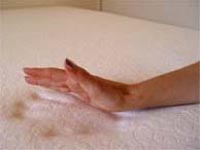
Astronauts rely on sleeping pills in space
You might think falling asleep in space would be easy - the quiet, the darkness, all those stars to count. But new research suggests the majority of astronauts don't get enough asleep, and that what sleep they do get is chemically induced. ... more
|  |

US looks to Japan space program to close Pacific communications gap
Tokyo's space initiative, set for launch in 2019, is turning into an effort to enhance ties with Washington in the cosmos. The US, shifting its military strategy to the Asia-Pacific, is looking for ... more
|  |

 HawkEye 360 boosts RF coverage with new Cluster 13 satellites
HawkEye 360 boosts RF coverage with new Cluster 13 satellites

 Slow orbital wobble patterns drive ancient greenhouse climate swings
Slow orbital wobble patterns drive ancient greenhouse climate swings

 Ordovician mass extinction cleared the way for jawed fishes to rise
Ordovician mass extinction cleared the way for jawed fishes to rise

|  |

NASA Upgrades Its 3-D Spacecraft App
A new-and-improved version of NASA's Spacecraft 3D app for mobile devices is launching to coincide with the second anniversary of the Mars Science Laboratory Curiosity rover's landing on Mars. In ad ... more
|

NASA's Space Launch System Boosters Office Completes Critical Design Review
As progress continues on NASA's new rocket, the Space Launch System (SLS), the solid rocket boosters team successfully completed its critical design review Aug. 6. This is an important milestone for ... more
|  |

Hitchhiking robot thumbs its way across Canada
A talking robot assembled from household odds and ends is hitchhiking thousands of kilometers across Canada this summer as part of a social experiment to see if those of its kind can trust humans. ... more
|
 |

Military training and simulation revenues to remain steady
Revenues in the world's military training and simulation market will remain steady in the near future. ... more
|  |

Fourth MUOS Communication Satellite Clears Launch-Simulation Test
The fourth Mobile User Objective System (MUOS) satellite in the launch order is progressing in its final testing phase, having successfully cleared acoustic tests. This evaluation used powerful soun ... more
|
 More Tasks for China's Moon Mission
More Tasks for China's Moon Mission





 SwRI tests rooftop solar fire behavior and mitigation options
SwRI tests rooftop solar fire behavior and mitigation options Fast FPGA pulse shaping clears neutron gamma pile ups in nuclear detectors
Fast FPGA pulse shaping clears neutron gamma pile ups in nuclear detectors Bayesian neural net sharpens thorium 232 fission yield data
Bayesian neural net sharpens thorium 232 fission yield data